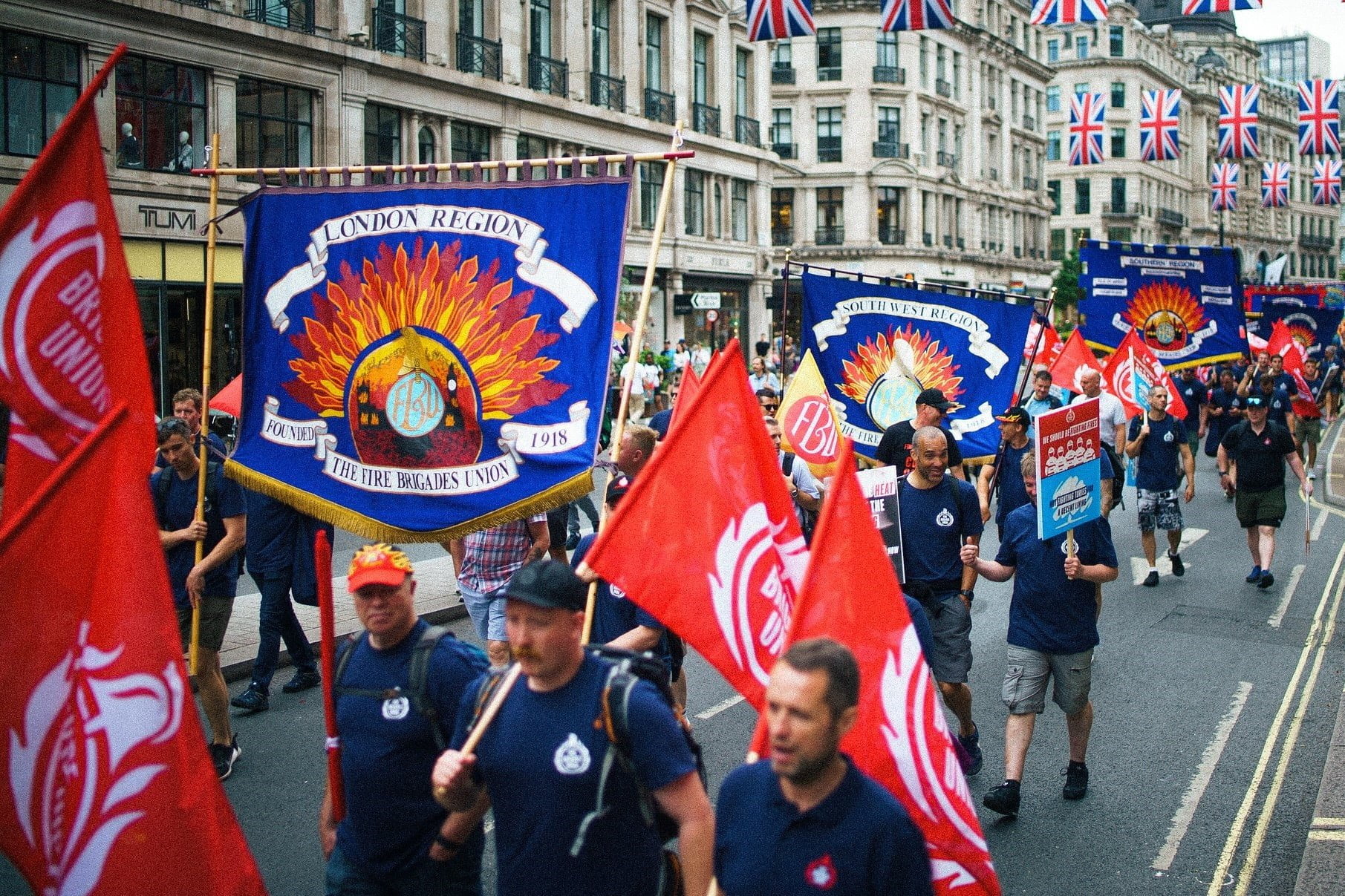The last few months have seen a wave of strikes, with new layers of workers being drawn into the class struggle. The latest union joining the fray is the Fire Brigades Union (FBU).
On 30 January, the FBU announced an overwhelming ballot result: 88% of members voted for industrial action, on a 73% turnout. This will mean that the union will be taking its first nationwide strike action since 2003.
We spoke to David Pike – brigade secretary of the Manchester FBU, and a veteran firefighter of 26 years – about the ballot, as well as the events and conditions that have led up to this.
Cost of living
 The strike ballot followed a long campaign for fair pay, which the FBU started in August last year. Pay is bargained for at a national level. Each year the union has to “doff its cap and beg fire-and-rescue employers for a decent pay rise”, in David’s words.
The strike ballot followed a long campaign for fair pay, which the FBU started in August last year. Pay is bargained for at a national level. Each year the union has to “doff its cap and beg fire-and-rescue employers for a decent pay rise”, in David’s words.
For the last 10-12 years, firefighters have been offered next to nothing: pay offers of one or zero percent. These have been consistently below the rate of inflation, effectively amounting to pay cuts. In real terms, firefighter pay has fallen by £4,000.
“Firefighting is a vocation, rather than something people join for money,” David explained. “But at this stage enough was enough, as this was really not a good position to be in. Firefighters were left unable to pay bills or heat their homes, and many were visiting food banks.”
Strike wave
In June 2022, as the RPI measure of inflation rose to above 12%, firefighters were offered a miserable 2% pay increase. In October 2022, after the FBU membership rejected the offer, this was revised to 5% – still a dramatic real-terms cut.
Firefighters rightly saw this as an insult to the profession, as evidenced by the resounding 79% consultative vote of FBU members to reject this offer. At the same time, militant strikes from unions such as the RMT and CWU had begun to gain widespread public support.
“November onwards was the point where it was clear that we were getting nowhere with the fair pay campaign and weren’t being listened to,” said David. “Our employers had said to us that the 5% pay offer was it, so we had to decide what to do next.”
David also cited the influence of other unions in the movement striking: “At the same time, many other trade unions like the RMT were absolutely in the right space. We saw the strike wave was getting bigger and bigger.”
Austerity
Of course, this dispute isn’t just about pay. Without an increase in central funding, any increase in pay would have to come from cuts to fire service budgets and staffing elsewhere – in other words, robbing Peter to pay Paul.
Ten years of brutal austerity have already resulted in a massive reduction in the number of firefighters and equipment. This is making it harder and harder to deliver a safe level of service, and is raising response times.
Over the last decade, 1-in-5 firefighter jobs have been cut, amounting to a total of 11,500 fewer firefighters. In Greater Manchester alone, there are now 800 fewer frontline staff.
This means the typical Greater Manchester station has gone from having 11 firefighters on duty to just four or five. There has also been a reduction in specialist equipment, including fire engines.
“No city is getting smaller, but services are being cut on a weekly basis,” David explained. “It’s not just fires that we deal with, but a spectrum of incidents that often require specialist skills and equipment.
“We cannot provide the level of response required when services are being slashed at the front line. New types of emergencies that were previously rare are emerging, and overall demand is going through the roof.”
The overstretching of fire services makes conditions for the firefighters themselves much less safe, and raises the risk of serious injuries and deaths in the line of duty. The recent tragic death of firefighter Barry Martin in Edinburgh is a cruel demonstration of what this can potentially lead to.
“Just the beginning”
The Tories have framed their anti-strike bill as a way of guaranteeing ‘public safety’.
It’s crystal-clear, however, that what’s rendering these services unsafe is not the strikes, but the massive cuts to funding we’ve seen over the last decade – something firefighters understand all too well.
There is a growing class consciousness in society. Workers across different unions are seeing their shared interests, and understanding the need to link-up their disputes and take coordinated action.
FBU and RMT representatives are already regularly attending one another’s pickets and speaking on each other’s rally platforms.
The huge, coordinated strikes and demonstrations on 1 February are also a clear example of this drive for unity. Further days of action like this will be needed though to beat back the anti-strike bill and the bosses’ offensive.
Workers’ confidence is only growing. The ruling class is absolutely terrified, and has resorted to launching all sorts of smears and attacks in response. But the militant mood of the workers themselves shows no signs of abating.
David summed it up for us: “They keep putting hurdles down for workers to get over – we will continue to jump every one of them! More coordinated action across the whole trade union movement is necessary for the future of the country and the workers.”
“After all, the workers make the country run, politicians can’t put fires out or drive trains. As months go by without a resolution, the movement keeps getting bigger. This feels like just the beginning.”






